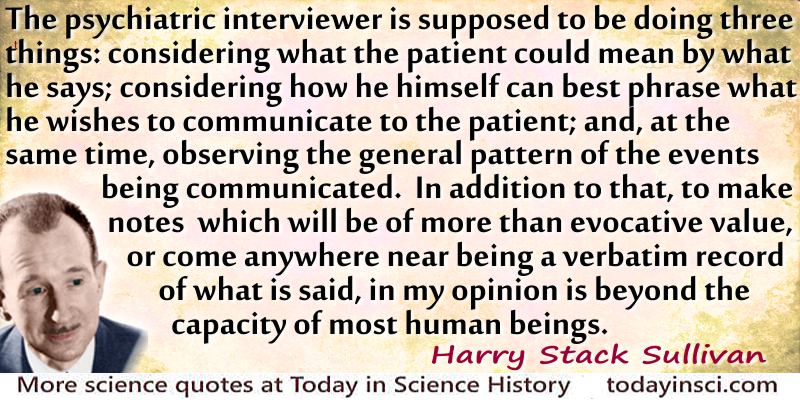 (source)
(source)
|
Harry Stack Sullivan
(21 Feb 1892 - 14 Jan 1949)
American psychiatrist who developed a theory of psychiatry based on interpersonal relationships.
|
Harry Stack Sullivan
“The psychiatric interviewer”
Illustrated Quote - Large (800 x 400 px)
More Harry Stack Sullivan quotes on science >>
In his book, The Psychiatric Interview, Harry Stack Sullivan describes the task of taking meaningful notes while meeting with a patient, but confesses:
…if enough attention is paid to them so they are legible, this is very apt indeed to interfere with things of much greater importance to the patient if not to the psychiatrist.”
Then he puts this in context of the greater goals:
“The psychiatric interviewer is supposed to be doing three things: considering what the patient could mean by what he says; considering how he himself can best phrase what he wishes to communicate to the patient; and, at the same time, observing the general pattern of the events being communicated. In addition to that, to make notes which will be of more than evocative value, or come anywhere near being a verbatim record of what is said, in my opinion is beyond the capacity of most human beings.”
He continues to explain that the first necessity is to put the patient at ease:
“Even if the interviewer were able to do all this, when he deals with patients who are quite suspicious, even paranoid, in their attitudes, the making of notes will probably guarantee that the interviewer hears an exceedingly studied group of communications, in which all the nuances which he might otherwise catch on to are missing. Nevertheless, there are occasions—for example, when I am getting the gross social data about a person—when I do feel I should have a few notes. On such occasion I tell the patient that I have really a gift for forgetting things that might be handy, and therefore, if he doesn’t mind, I shall make a few notes…”
- Science Quotes by Harry Stack Sullivan.
- 21 Feb - short biography, births, deaths and events on date of Sullivan's birth.
- Harry Stack Sullivan - context of quote “There is no fun in psychiatry” - Medium image (500 x 250 px)
- Harry Stack Sullivan - context of quote “There is no fun in psychiatry” - Large image (800 x 400 px)
- Harry Stack Sullivan - context of quote “The headaches that psychiatry induces” - Medium image (500 x 250 px)
- Harry Stack Sullivan - context of quote “The headaches that psychiatry induces” - Large image (800 x 400 px)
- Harry Stack Sullivan - context of quote “Enthusiasm about psychiatry is preposterous” - Medium image (500 x 250 px)
- Harry Stack Sullivan - context of quote “Enthusiasm about psychiatry is preposterous” - Large image (800 x 400 px)
- Harry Stack Sullivan - context of quote “The psychiatric interviewer” - Medium image (500 x 250 px)
- The Interpersonal Theory of Psychiatry, by Harry Stack Sullivan. - book suggestion.









